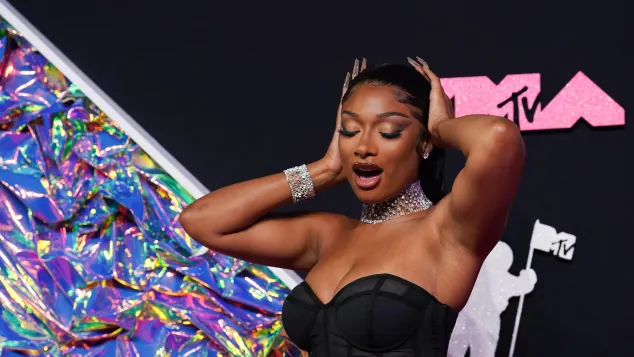The legal action follows Cooper's alleged campaign of cyberbullying and spreading misinformation about the 2020 shooting incident involving Tory Lanez. The rapper seeks a jury trial to address the emotional distress caused by these actions.
- Megan Thee Stallion is taking legal action
- She is suing a blogger for defamation and more
- HERE is what we know so far
Megan Thee Stallion's Legal Battle Against Harassment
Renowned rapper Megan Thee Stallion has initiated legal proceedings against YouTuber Milagro Cooper, also known by her online alias Milagro Gramz. The lawsuit, filed in Florida's Southern District Court, accuses Cooper of engaging in a relentless campaign of harassment and cyberbullying.
According to the lawsuit, Cooper's actions have exacerbated the emotional distress stemming from the 2020 shooting incident involving Tory Lanez.
Central to the lawsuit is the claim that Cooper has been involved in promoting deepfake pornography of Megan Thee Stallion. The rapper alleges that Cooper shared altered sexual depictions of her online, encouraging her followers to engage with this content.
This act of sharing and promoting deepfake images has intensified the emotional turmoil for Megan Thee Stallion, who has been vocal about the impact of cyber harassment.
The lawsuit outlines a "years-long campaign of harassment" orchestrated by Cooper on behalf of Tory Lanez, whose real name is Daystar Peterson. Lanez was convicted in 2022 for shooting and injuring Megan Thee Stallion and received a 10-year prison sentence in the subsequent year.
The legal document highlights Cooper's persistent efforts to undermine the rapper's credibility, including promoting debunked conspiracy theories related to the shooting incident. Cooper's social media activity has been scrutinized in the lawsuit, with screenshots capturing her interactions and comments that allegedly perpetuate false narratives.
She is accused of using her platforms to question the legitimacy of Megan Thee Stallion's claims and to advocate for Lanez's release. Notably, Cooper's X account has been suspended, and her Instagram presence appears to be inactive.
The problem with the future
Deepfakes are artificial intelligence-generated videos produced by machine-learning techniques to create realistic but fake images and audio. Such content portraying Taylor Swift spread on X earlier this year before being blocked, and similar imagery has spread in recent years.
The fact is, deepfakes pose a significant challenge for famous individuals, raising concerns about authenticity, privacy, and reputational harm. These hyper-realistic videos, generated using artificial intelligence, can easily distort reality by placing individuals in fabricated scenarios or making them appear to say things they never did.
For celebrities, politicians, and other public figures, this technology can be particularly damaging, as it can undermine their credibility and manipulate public perception.
The potential for deepfakes to be used maliciously—such as in revenge pornography or to spread false information—adds another layer of risk, leading to personal and professional repercussions that can be difficult to rectify.
Furthermore, the proliferation of deepfake technology complicates the already challenging landscape of media consumption. As audiences become more skeptical about the authenticity of what they see, distinguishing between genuine content and manipulation becomes increasingly difficult.
This erosion of trust can impact not only individual reputations but also broader societal discourse, as misinformation spreads more easily. For famous people, the stakes are high; a single deepfake video can lead to public backlash, legal issues, or damage to their brand.
Addressing these challenges requires a multifaceted approach, including advancements in detection technology, legal frameworks to combat misuse, and increased public awareness about the realities of deepfakes.
Also interesting:
Megan Thee Stallion, whose real name is Megan Pete, is seeking a jury trial to address the emotional distress and reputational damage caused by Cooper's actions. The lawsuit emphasizes the need for accountability in the digital age, where misinformation and harassment can have profound effects on individuals' lives.
Let's wait and see what happens next in this particular saga...





